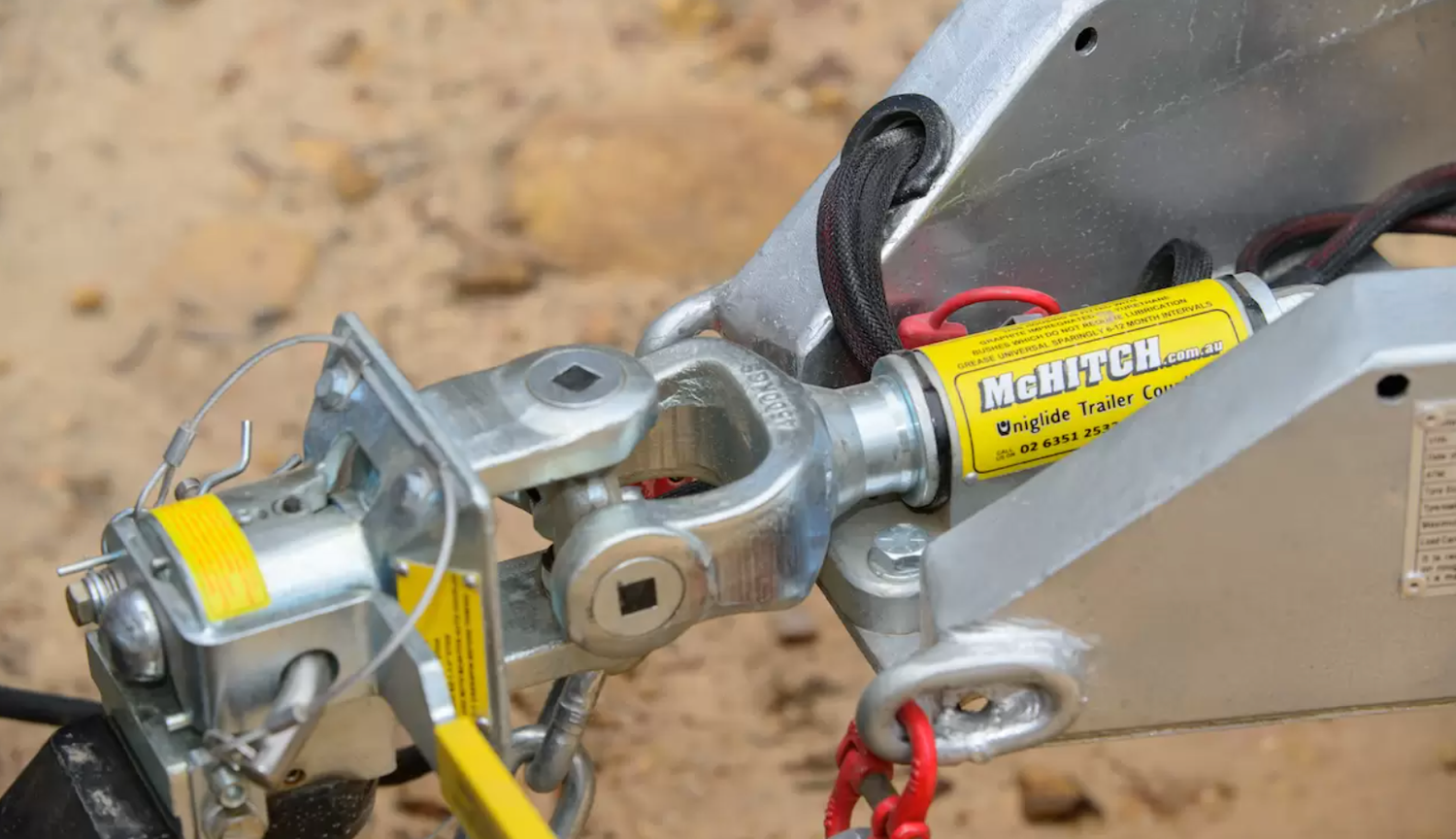Article from RV Daily
Using the McHitch Uniglide Trailer Coupling has made hitching, unhitching, and towing so much easier.
Hitching and unhitching the van can be such a fraught procedure. After reversing the tow rig, it’s probably the next significant item on the pending divorce papers. Even seasoned pros can have their off days and UHFs, well-practised hand signals or a reversing camera can be undone with one more comment about ‘just a bit more’ or ‘you’ve still got half a metre’… ‘do you want me to have a go?’ It needn’t be that way.
On a recent trip, we had the bigger RAM 2500, taller than the 1500 versions we’re using for Foodie Trails. Waiting at Ezytrail Penrith to collect the Parkes 18 model, I suddenly realised the height disparity between the towbar on the car and the van’s drawbar. It was about four or more inches and to try to join the two would have been both ridiculous and dangerous. So I had to go and buy a drop tongue to make the hitch-up a level and safe job.
When the Foodie Trails series was locked into towing with a RAM 1500 and Ezytrail combination again, I thought we might need to address this possible problem from the outset. A few phone calls later, and we had secured the use of the McHitch Uniglide trailer auto coupling. We had explained our requirements to Joe McGinnes, the McHitch’s developer, and he told us to visit with the RAM/Ezytrail set-up, and he’d make sure that our drawbar was level from the get-go.

We have prepared a whole story on why it’s essential to make sure this vital area of the tow rig is level, here.
Firstly, the RAM 1500 is nowhere near as high as the 2500, so we used one of Joe’s two-inch inverted forged drop tongues, and Joe fitted the McHitch receiver to that. It’s a different and larger unit than a towball or pin, but it becomes evident why when you get to hitching up.

The factory hitch on the Ezytrail was removed, and the McHitch coupling bolted down in its stead. The whole kit comes with a handbrake too, but our drawbar frame meant we didn’t have time to re-work the fittings to make it happen.
Even though the vans we would be using were well under a 3500kg rating, we opted to use the 4500kg McHitch coupling to satisfy Joe, given the forces involved with a large tow vehicle. McHitch makes couplings up to a six-tonne rating, and all are compatible with a weight-distribution system if you end up using one on your rig.

To know when you’re level, or at the right height for hitching on level ground, when coupled for the first time, you can mark your jockey wheel leg with a marker, so that you’ll speed up the process. However, for uneven surfaces to unhitch, Joe showed me a neat little trick. As you’re winding the jockey wheel, keep a finger or two on the tow tongue where it enters the receiver on the tow vehicle, and you will feel the weight lift off the car as the hitch goes through the rise. Again, a time saver – and it’s relevant because the McHitch separates differently than a towball or pin device.
HITCHINGThe coupling pin is effectively locked into the receiver. As you reverse, the wide plated area around the receiver’s opening is somewhat forgiving but once you push it home the locking lever at the back of the receiver is secured by a pin sliding into place to hold it down. You then slide a hitch pin that passes through the main coupling shaft and lock that with an R-clip. So that’s three methods of security.

UNHITCHINGAs mentioned before there are two ways of knowing the best height to release the coupling’s handle. Once the van weight is off the tow vehicle, you can push in the locking pin, raise the handle and take out the R-clip and hitch pin. Drive forward. It’s simple.

VERDICTThe most significant advantage of the McHitch coupling is its precise nature. The large receiver collar helps you slip it on. If you have a reversing camera then using a magnetic yellow guide (if you’re by yourself) makes lining up easy, and the lock-on is automatic; so you don’t have to get out and lower the van onto a ball or pin.

In use, and we have now towed thousands of kilometres with a roughly three-tonne load all over New South Wales, and Queensland is smoother and quieter towing. There has been no shunting or banging and clattering that you get with a towball. The positive locking makes a world of difference.
The prototype coupling was derived via a LandCruiser Universal Joint, hence the Uniglide name, and indeed still is a UJ from that vehicle and so offers superb articulation on all axes.
The McHitch coupling we have used has boosted towing confidence and improved our experience along the way and means that with one less thing to worry about, we can enjoy the drive even more.

RRP $495 (hitch set) $129 (tongue). For information visit: mchitch.com.au or call 1300 501 517Edit: As of February 2023, McHitch no longer sells these products.


